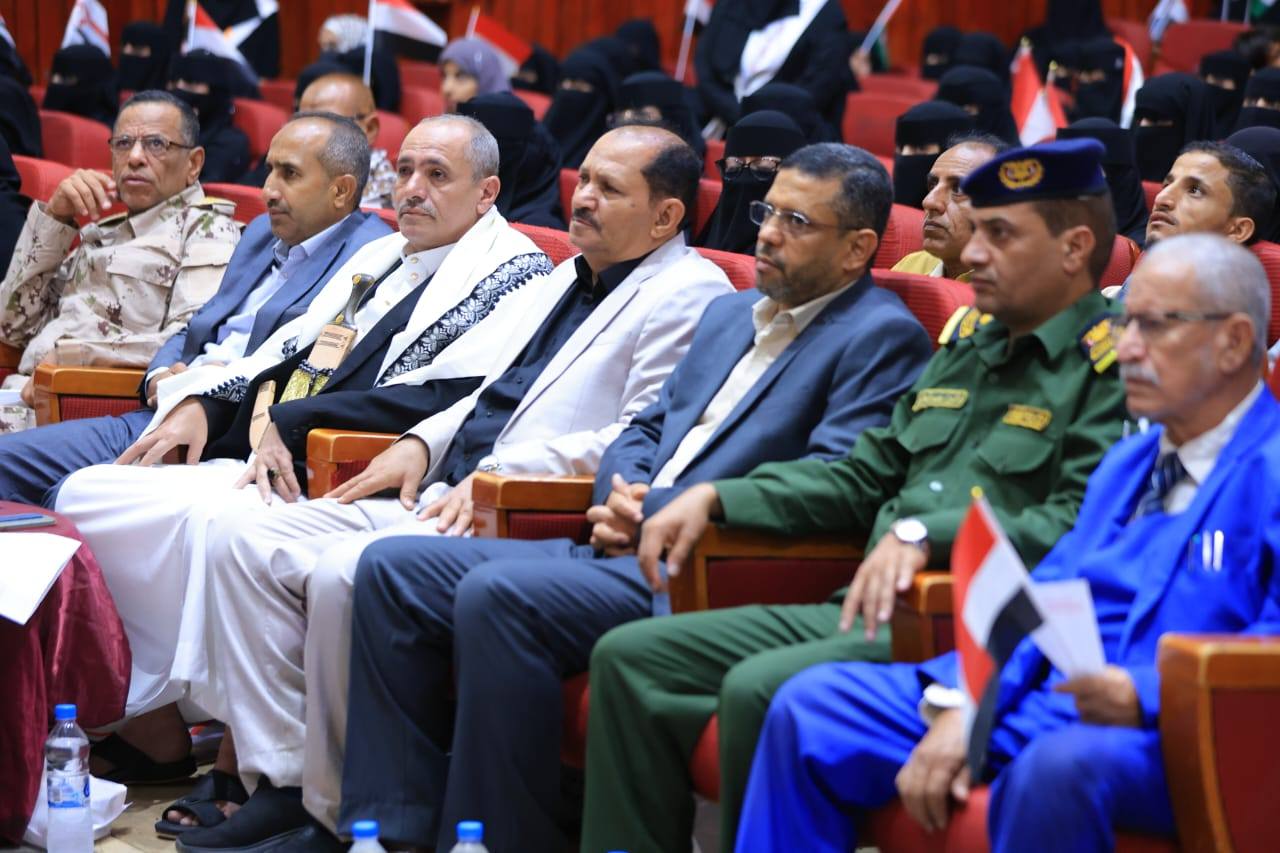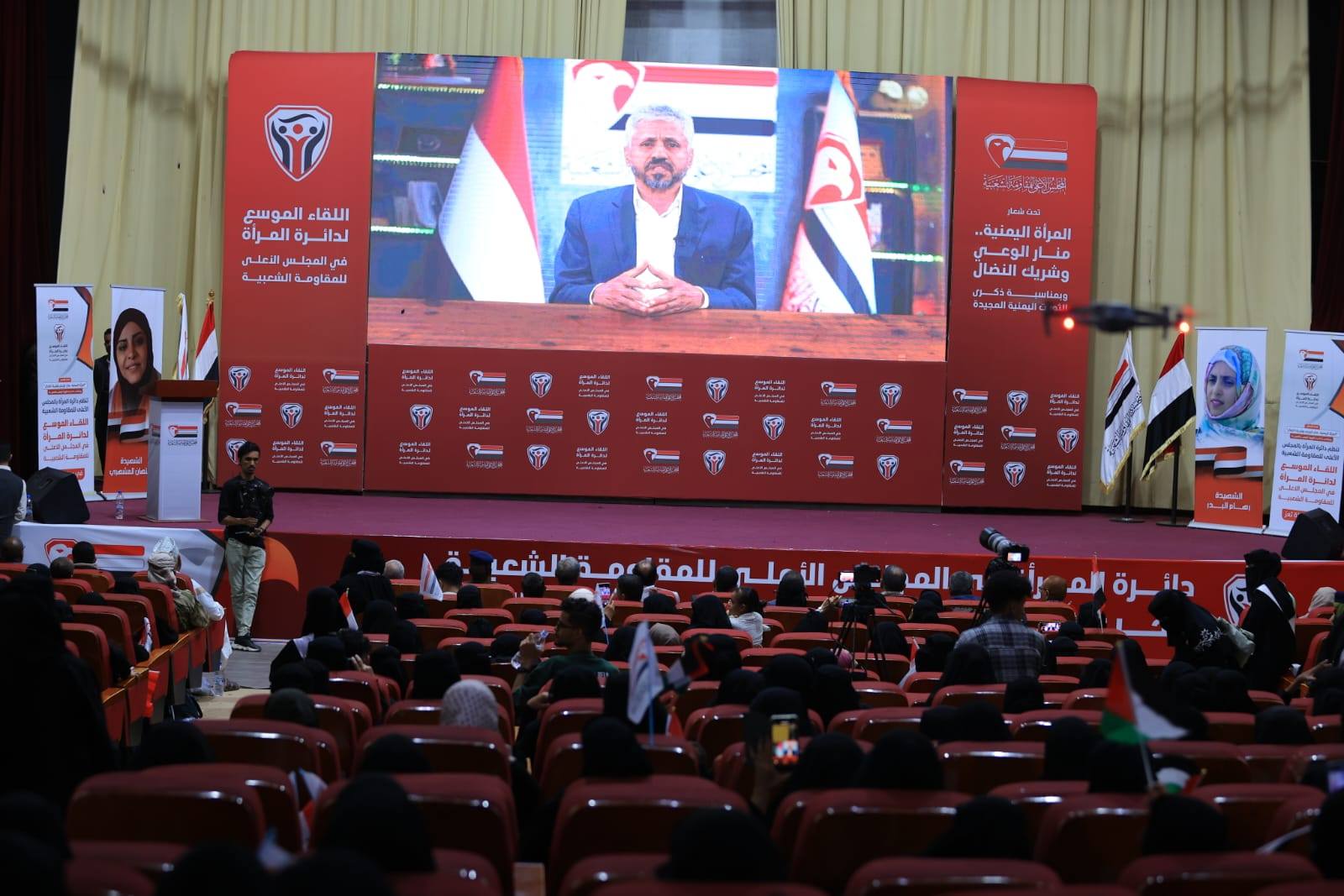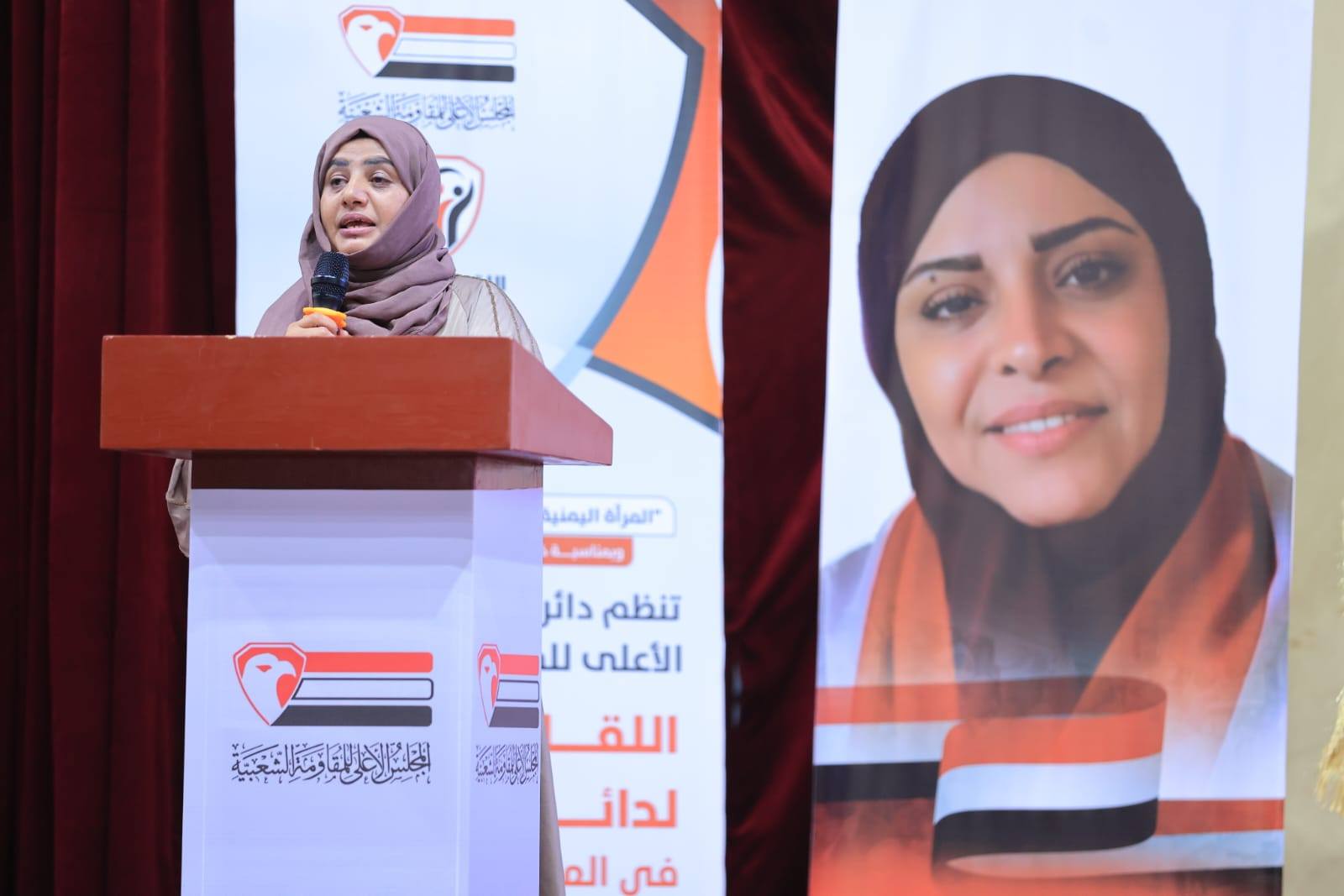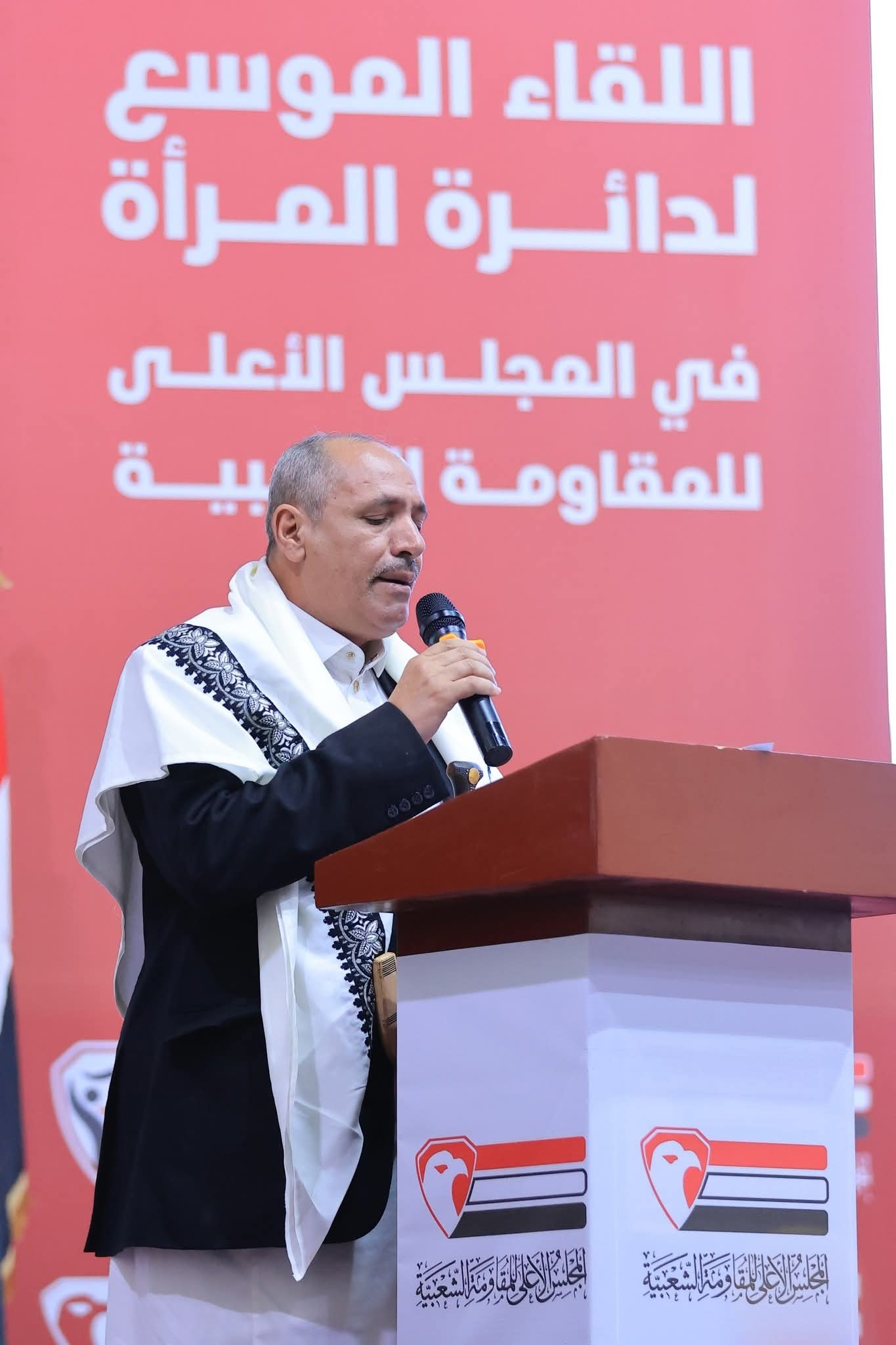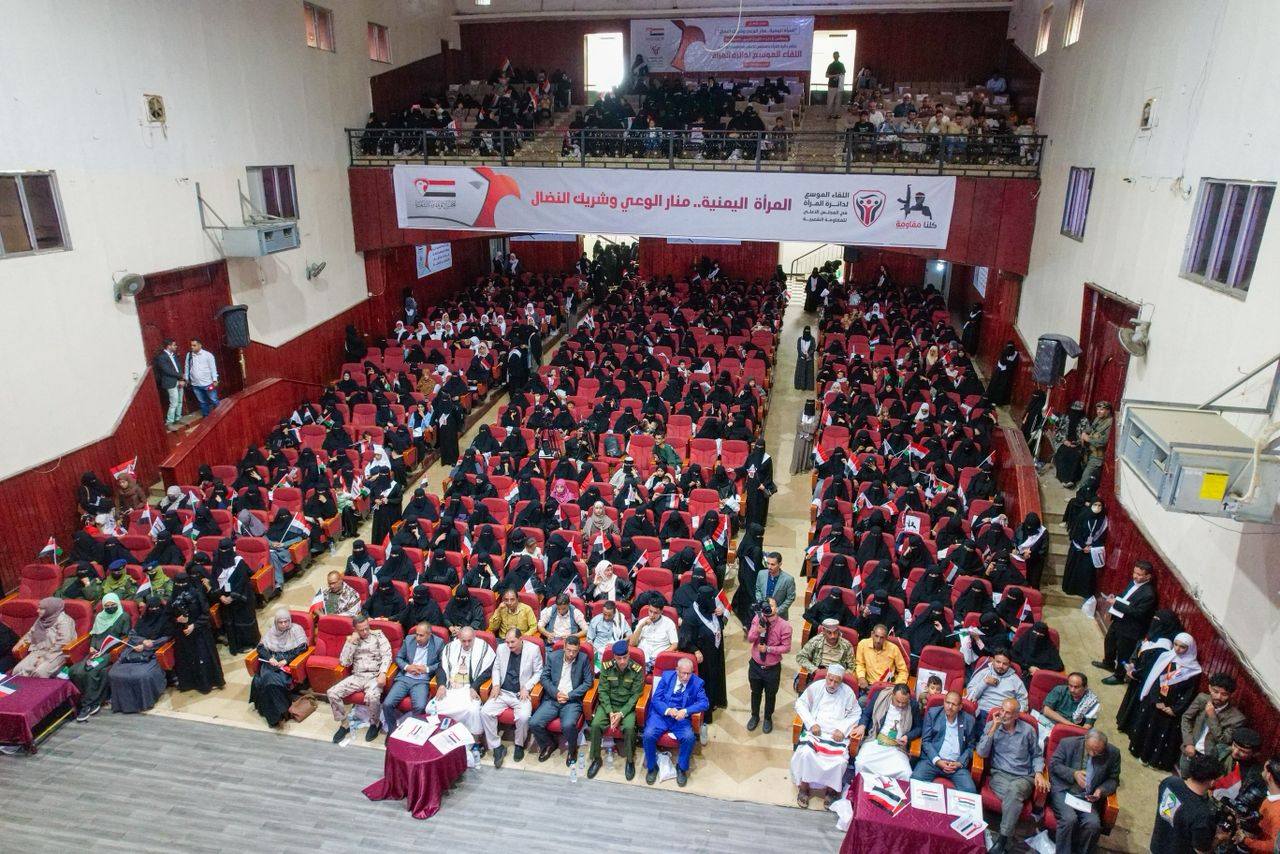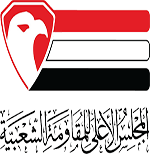First expanded meeting in Taiz organized by the Women's Department of the Supreme Council of the Resistance
2025-10-15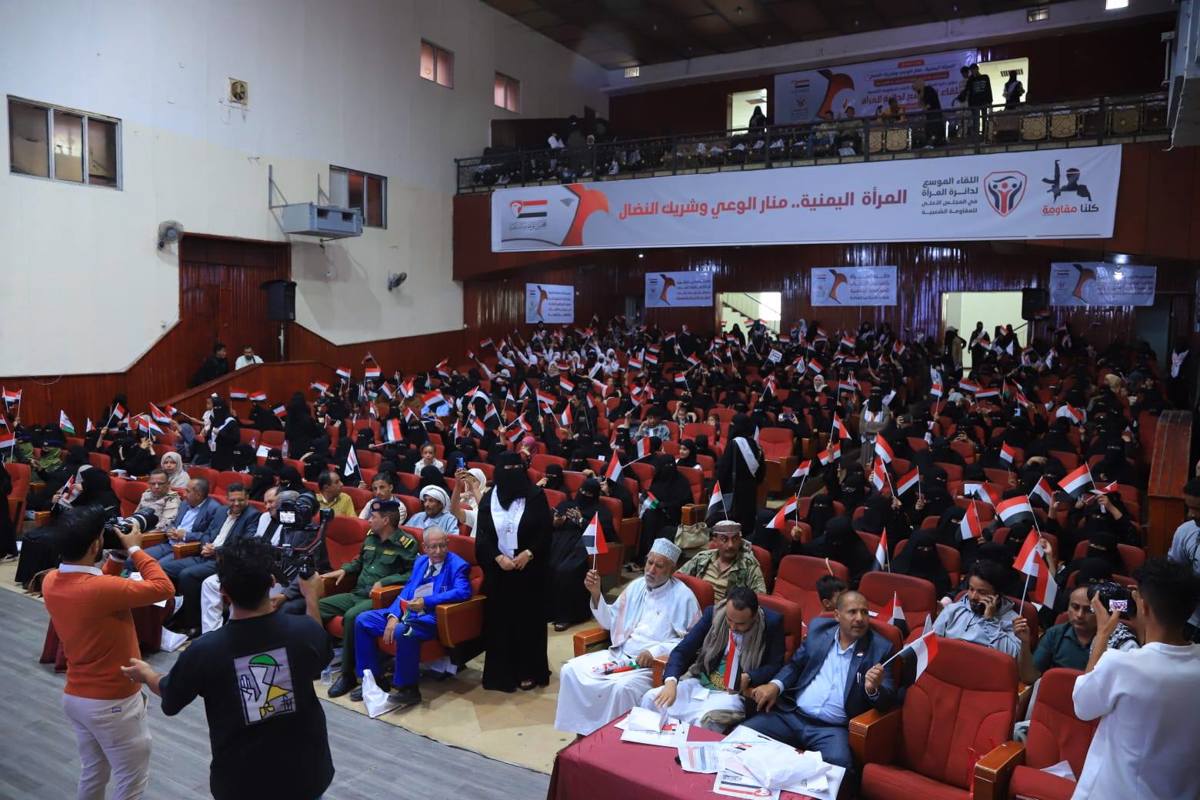
First expanded meeting in Taiz organized by the Women's Department of the Supreme Council of the Popular Resistance... A new beginning for women's struggle and the signing of the Resistance Honor Charter
Taiz: Exclusive
In a unique and unprecedented meeting, the Women's Department of the Supreme Council of the Popular Resistance held the first expanded meeting for women in Taiz Governorate on Sunday. The meeting was attended by a large number of women representing all the governorate's districts, as well as female leaders from various governorates. The meeting was also attended by leaders from the local authorities, military and security forces, and the Popular Resistance.
In his speech via video conference, Sheikh Hamoud Saeed Al-Mikhlafi, head of the Supreme Council of the Popular Resistance, said that women in Taiz have played heroic roles during the years of confrontation with the Houthi militia, by supporting fighters, maintaining the cohesion of the internal front, and engaging in military and security training and rehabilitation. He emphasized his belief in the ability of women in Taiz Governorate to contribute to improving the general situation and overcoming exceptional challenges.
Al-Mikhlafi spoke about the severe damage to vital sectors caused by the war and blockade, particularly the education and health sectors, and the water crisis. He praised the significant role played by female teachers in maintaining the educational process despite low and delayed salaries. He considered education the governorate's capital and its weapon against the coup plot, which seeks to erase Yemeni identity.
The head of the Supreme Council of the Popular Resistance also revealed the council's intention to launch a "Charter of Honor for the Resistance," aiming to enhance stability, support efforts to achieve justice, normalize public life, and direct efforts toward confronting the challenges posed by the Houthi militia and the difficult living conditions.
For her part, Ms. Osan Mohammed Saeed, head of the Women's Department in the Supreme Council of the Popular Resistance, emphasized that the expanded meeting represents the beginning of a new phase of struggle and resistance aimed at restoring state sovereignty and protecting the achievements of the revolution and the republic. She called on women to be aware and transform suffering into voluntary and political community projects that contribute to restoring the state. She explained that the life of the martyr Iftahan Al-Mashhari embodies the meanings of sacrifice, success, and belonging to the homeland.
It also called on influential elites and entities to abandon the era of dependency and divisions and work as a lever for unifying the comprehensive national civil project. It emphasized the need for state institutions to exercise effective sovereignty over the entire national territory and restore the trust of the people. It affirmed that Taiz will remain the symbol of revolution and resistance and the guardian of the national will.
The closing statement of the expanded meeting emphasized that women are essential partners in the popular resistance and the national project. It called for empowering them to hold decision-making positions in state and societal institutions, and for documenting their experiences and sacrifices through media and education.
The statement also emphasized the launch of training and rehabilitation programs for women in the liberated areas, the inclusion of all women's components in the activities of the Women's Department, the demand for the prosecution of those wanted by security forces, the provision of protection for female activists and victims of violations, and the provision of care for the families of martyrs, the wounded, and the abducted, providing them with all forms of support.
For her part, activist and lawyer Shinaz Al-Akhaly, in her speech on behalf of the preparatory committee for the expanded meeting, emphasized the pioneering role of Yemeni women, particularly in Taiz, since the launch of the popular resistance against the Houthi militia in 2016.
She praised the sacrifices of martyrs Reham Al-Badr, Aida Al-Absi, and Ifthan Al-Mashhari as models of steadfastness and courage, emphasizing that the expanded meeting aims to enhance women's empowerment and demand justice for the cases of women who defend the homeland, foremost among them the case of martyr Ifthan Al-Mashhari. She emphasized that women will continue the struggle for freedom and dignity, and called for support for the state in restoring its duties and correcting the security, service, and administrative shortcomings, and supporting the legitimate struggle of Yemeni women.
In a speech on behalf of the local authority, Dr. Abdul-Qawi Al-Mikhlafi, First Deputy Governor of Taiz, emphasized that Yemeni women have been and continue to be essential partners in the national struggle and the battle to restore the state, noting that the construction of the new Yemen will not be complete without their active participation in decision-making, action, and the field.
Al-Mikhlafi praised the role of women in Taiz, who have sacrificed their lives, embraced the wounded, and contributed to raising awareness. He emphasized that the local authority, led by Governor Nabil Shamsan, supports all efforts aimed at empowering women and strengthening their presence in development and resistance. He recalled the sacrifices of martyrs Reham Badr, Aida Al-Absi, and Ifthan Al-Mashhari, as symbols of loyalty and devotion to the homeland. He called for the expanded meeting to be a new beginning for women's presence in the battle for awareness, construction, and liberation.
In his speech, Colonel Nabil Al-Adeimi, a leader in the National Army and the Popular Resistance, emphasized the pivotal role of women in the popular resistance since its inception against the Houthi coup militia. He noted that women have been present at the heart of the battle, providing food to fighters, contributing financially, launching initiatives, and collecting donations to support the resistance, in addition to caring for the wounded and the families of martyrs and abductees.
Al-Adeimi described Yemeni women as the fundamental pillar of the resistance and the creators of glory, noting that they are the wives of martyrs, the mothers of the wounded, the sisters of heroes, and the daughters of the resistance fighters. He also pointed out that they were victims of war alongside men, citing their sacrifices in defense of dignity and homeland. He concluded his speech by saluting the valiant Yemeni women, describing them as the memory of the resistance and its vibrant spirit, the guardians of the republican dream, partners in victory and liberation, and creators of the coming dawn.
The security speech, delivered by Dr. Yahya Al-Atwani, media advisor to the Director of Security in Taiz, emphasized that the governorate's police are continuing to pursue wanted individuals and outlaws without leniency. He pointed to the security achievements despite the limited resources, emphasizing their commitment to the law and protecting citizens.
Al-Atwani called for unifying ranks behind state institutions and renouncing differences for the sake of the security and stability of the governorate.
The guest speaker, delivered by Samia Al-Qahali, head of the Women's Committee in the Popular Resistance Council in Amran, emphasized the pivotal role of Yemeni women in confronting the Houthi militia, praising the women of Taiz as a safety valve and a pillar of steadfastness. She highlighted their support, relief, and active participation in the battle for freedom and dignity, emphasizing that Yemeni women are resisting attempts to erase national identity, despite being among the greatest victims of the war. She concluded by paying tribute to every Yemeni woman who resists.
In her speech, Anisa Al-Hamzi, on behalf of the Free Women of Taiz, emphasized that Yemeni women have been present at every stage of the national struggle, from the September and October revolutions to the present day. She emphasized that women's struggle today is for the sake of building a just federal Yemen, a state of equality and dignity worthy of the sacrifices of both men and women.
During the event, a visual report on the most prominent achievements of the Supreme Council of the Popular Resistance was presented, along with a reportage detailing women's contributions to supporting the popular resistance since the beginning of the war. Artistic performances and national anthems were also featured.
At the conclusion of the expanded meeting, the participants signed a code of honor to support the popular resistance. This code stipulates respect for national interests, the protection of civilians and their rights, the promotion of the values of integrity, loyalty, and solidarity, and the disavowal of anyone who violates these values or exploits the resistance for personal gain. They affirmed their full support for the Supreme Council of the Popular Resistance and the National Army in the battle to restore the state and end the Houthi coup.
